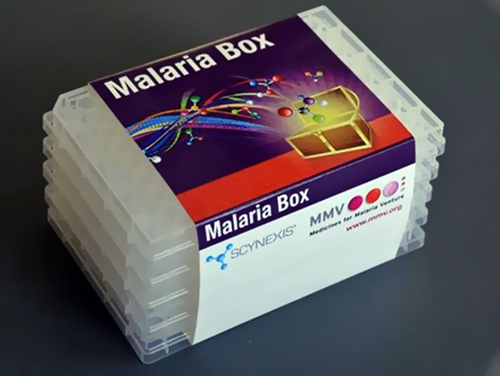29 July 2016. A worldwide collective research project tested 400 compounds as potential anti-malarial drugs, which led to the start of more than 30 new drug development programs for malaria and other diseases. The open-source initiative is described in yesterday’s issue of the journal PLoS Pathogens.
The project called Malaria Box, organized by the advocacy group Medicines for Malaria Venture, distributed the 400 test compounds to 200 labs in 30 countries between 2011 and 2015. Malaria Box, an actual physical package, contained test kits for the labs to screen the candidates for activity against Plasmodium falciparum malaria parasites transmitted by mosquitoes. In humans, the parasite multiplies in the liver, then infects red blood cells. World Health Organization says the disease occurs in nearly 100 countries, with some 214 million cases reported in 2015, causing up to 438,000 deaths.
The global effort, coordinated by University of Washington medical professor and first author Wesley Van Voorhis, detailed to the project during a sabbatical, sought to accelerate the discovery of new anti-malarial drug candidates, by breaking down institutional barriers between academic and industry labs. The 400 test compounds resulted from an initial screening of more than 25,000 candidates found primarily in industry libraries.
The test compounds in Malaria Box kits were sent free of charge to labs for more detailed analysis on activity against malarial parasites, with the stipulation that their findings be placed in the public domain. Their results were then collected in a standardized format which allowed for efficient meta-analysis.
The findings report on 236 screens of the compounds, which identified 135 candidates that act on the malaria parasite in different ways, and at various stages in parasite’s life-cycle. In addition, participating labs reported hits on a number of other tropical disease pathogens, including parasitic worms and dengue, as well as human cancer cells. The authors say more than 30 new drug development programs, including a colon cancer treatment by National Cancer Institute, can be traced to findings from this initiative.
Medicines for Malaria Venture hopes to duplicate this outcome with a similar program begun in January 2016 called Pathogen Box covering a broader range of infectious agents. Like Malaria Box, this new kit contains 400 test compounds representing tuberculosis, dengue, parasitic worms, Chagas disease, and other tropical diseases, as well as malaria.
Read more:
- $1 Million Challenge Seeks Child Health Solutions
- Company, Charity to Discover Antibiotic Boosters
- C. Difficile Infection Tested with Synthetic Gut Microbe
- FDA Approves Cholera Vaccine
- Grid Computing Power Applied to Zika Research
* * *


 RSS - Posts
RSS - Posts
You must be logged in to post a comment.